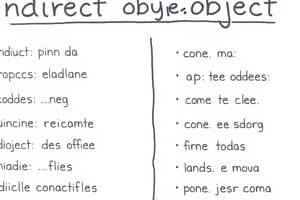Podcast
Questions and Answers
What is the main difference between direct and indirect objects in a sentence?
What is the main difference between direct and indirect objects in a sentence?
- Direct objects are the recipients of the action, while indirect objects are the doers of the action.
- Direct objects are always people, while indirect objects are always things.
- Direct objects receive the action, while indirect objects perform the action.
- Direct objects are the things being acted upon, while indirect objects are the ones receiving the direct object. (correct)
What is the indirect object in the sentence 'I gave him a book'?
What is the indirect object in the sentence 'I gave him a book'?
- The book
- Gave
- Him (correct)
- I
What determines whether to use 'lo' or 'le' in a sentence?
What determines whether to use 'lo' or 'le' in a sentence?
- The verb in the sentence
- The tone of the sentence
- Whether 'him' could be replaced with 'to him' or 'for him' (correct)
- The subject of the sentence
What is the direct object in the sentence 'They found him'?
What is the direct object in the sentence 'They found him'?
When is 'him' NOT a direct object?
When is 'him' NOT a direct object?
What do linguists say about the indirect object in a sentence?
What do linguists say about the indirect object in a sentence?
What is the purpose of the indirect object scene?
What is the purpose of the indirect object scene?
In the sentence 'Ellas nos found', what is the function of 'nos'?
In the sentence 'Ellas nos found', what is the function of 'nos'?
What is the word for 'us' as a direct object?
What is the word for 'us' as a direct object?
What type of pronouns are le, le, te, me, and nos?
What type of pronouns are le, le, te, me, and nos?
What is the location of 'me' in the memory palace?
What is the location of 'me' in the memory palace?
Why are you and your friends stuck at the fork in the road?
Why are you and your friends stuck at the fork in the road?
What is the purpose of the memory palace?
What is the purpose of the memory palace?
What is the sentence 'they nos found' equivalent to in English?
What is the sentence 'they nos found' equivalent to in English?
What is the location of 'le' in the memory palace?
What is the location of 'le' in the memory palace?
What is the tea guy with a beard asking you to do?
What is the tea guy with a beard asking you to do?
Flashcards are hidden until you start studying
Study Notes
Direct Object Pronouns
- Revisited the memory palace for direct object pronouns: la on the left, lo on the right, te in front, and me at the bottom.
- Introduced the word "nos" for "us" as a direct object (e.g., "ellas nos encontraron" means "they found us").
Indirect Object Pronouns
- Introduced a new scene with indirect object pronouns: le on the left, le on the right, te in front, and me and nos at the bottom.
- Indirect object pronouns are used when the action is performed for or to someone/something (e.g., "I gave him a book").
- Indirect objects are the recipients of the action in a sentence.
- If "him" can be turned into "to him" or "for him" in a sentence, use the indirect object pronoun "le" instead of the direct object pronoun "lo".
Key Points
- Direct object pronouns are used when the action is performed directly to someone/something (e.g., "they found him").
- Direct objects are the things/actions that receive the action in a sentence.
- Indirect object pronouns are used in situations where the action is performed for or to someone/something, making them the recipients of the action.
Studying That Suits You
Use AI to generate personalized quizzes and flashcards to suit your learning preferences.




